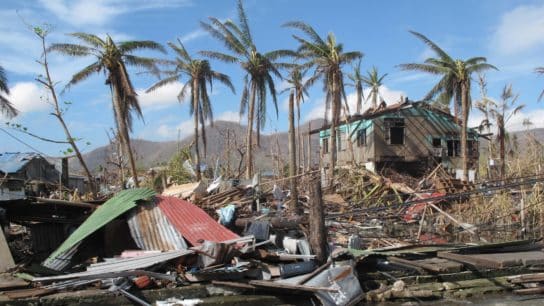Former White House advisers told E&E News that the former president hesitated to grant disaster aid to politically hostile states on “at least three occasions.”
—
Donald Trump deliberately withheld disaster aid to states he deemed politically hostile and will do so again if he wins November’s election, former White House advisers have said.
Mark Harvey, Trump’s former senior director for resilience policy, told E&E News that Trump initially refused to approve disaster aid in 2018 after deadly wildfires devastates California, historically a democratic-leaning state. The then-president only agreed after Harvey showed him that some heavily damaged counties had numerous Republican supporters.
“We went as far as looking up how many votes he got in those impacted areas … to show him these are people who voted for you,” said Harvey. “There’s no empathy for the survivors. It is all about getting your photo-op, right? Disaster theater to make him look good.”
According to E&E News, Trump’s disaster aid approval was heavily politicized in two other occasions: Hurricane Maria, which killed more than 3,000 people across Puerto Rico and the US Virgin Islands in 2017 and Hurricane Michael, which caused massive damage in Florida – a red state – a year later.
Olivia Troye, former Trump White House homeland security adviser, confirmed Harvey’s comments, adding that the Trump, who is running for office again in November’s election, is very likely to policitize future disasters.
The Trump campaign has criticized the Biden administration for its response to Hurricane Helene and Milton, which together claimed more than 250 lives and caused billions of dollars in damages in southeastern US. Trump has also repeatedly made false claims about the federal response in recent days.

Federal Emergency Management Agency (FEMA) Administrator Deanne Criswell last week warned that hurricane misinformation and conspiracy theories, many of which can be traced back to Trump and his supporters, are taking a heavy toll on hurricane responders and survivors.
“It’s creating distrust in the federal government, but also the state government, and we have so many first responders that have been working to go out and help these communities,” Criswell told reporters on Tuesday.
On its website, the agency fast-checked and debunked a series of falsities and direct attacks that have been rapidly spreading online, such as that FEMA only provides loans to disaster survivors or that it is blockading people in Florida and preventing evacuations.
FEMA has been stretched to its limits for years, despite the rapidly growing threat of climate change in the US. The agency, which has already tallied 19 billion-dollar weather disasters so far this year, declared an “immediate needs funding” moratorium in August, pausing nearly $9 billion in payouts for relief projects from prior disasters, effectively delaying recovery efforts.

Last week, Congress approved $20 billion for FEMA’s disaster relief fund as part of a stopgap spending bill to fund the government through December 20, though the measure left out billions of dollars in requested supplemental disaster funding. One hundred Republican members of Congress voted against the bill. Some of them represent states that have been hit hard by Helene, including Florida Representative Matt Gaetz and South Carolina Representative Nancy Mace.
A recent report by the Center for American Progress (CAP) found that 123 elected officials in Congress – 23% of the total – are climate deniers.
“These 100 representatives and 23 senators wield significant influence on public perceptions of climate change as well as on the speed and direction of climate policy in the United States. Members of Congress also receive publicly disclosed contributions, which may provide a window into the possible influence of the fossil fuel industry,” said CAP.
“It’s not going to be about that American voter out there who isn’t even really paying attention to politics, and their house is gone, and the president of the United States is judging them for how they voted, and they didn’t even vote,” Troye, who has endorsed Harris for president, told E&E News.
Featured image: Gage Skidmore/Flickr.
How can I contribute to a more sustainable planet?
- 🗳️ Vote for Climate Action: Exercise your democratic rights by supporting candidates and policies that prioritize climate change mitigation and environmental protection. Stay informed with Earth.Org’s election coverage.
- 👣 Reduce Your Carbon Footprint: Make conscious choices to reduce your carbon footprint. Opt for renewable energy sources, conserve energy at home, use public transportation or carpool, and embrace sustainable practices like recycling and composting.
- 💰 Support Environmental Organizations: Join forces with organizations like Earth.Org and its NGO partners, dedicated to educating the public on environmental issues and solutions, supporting conservation efforts, holding those responsible accountable, and advocating for effective environmental solutions. Your support can amplify their efforts and drive positive change.
- 🌱 Embrace Sustainable Habits: Make sustainable choices in your everyday life. Reduce single-use plastics, choose eco-friendly products, prioritize a plant-based diet and reduce meat consumption, and opt for sustainable fashion and transportation. Small changes can have a big impact.
- 💬 Be Vocal, Engage and Educate Others: Spread awareness about the climate crisis and the importance of environmental stewardship. Engage in conversations, share information, and inspire others to take action. Together, we can create a global movement for a sustainable future.
- 🪧 Stand with Climate Activists: Show your support for activists on the frontlines of climate action. Attend peaceful protests, rallies, and marches, or join online campaigns to raise awareness and demand policy changes. By amplifying their voices, you contribute to building a stronger movement for climate justice and a sustainable future.
For more actionable steps, visit our ‘What Can I do?‘ page.
This story is funded by readers like you
Our non-profit newsroom provides climate coverage free of charge and advertising. Your one-off or monthly donations play a crucial role in supporting our operations, expanding our reach, and maintaining our editorial independence.
About EO | Mission Statement | Impact & Reach | Write for us














